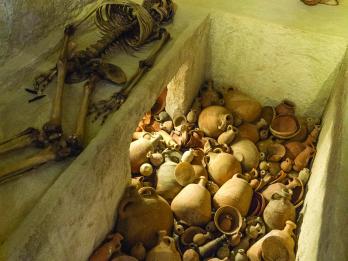Testament (Manheim)
Rebecca Halfon
1713
Knowing that with respect to money, if my husband will not agree, my last will and testament will not be valid, I request, for the sake of the One above, may His name be blessed forever and ever, he remember that the little capital we brought together to our marriage God blessed and increased greatly, and I helped with the trade and took care of business and I was suitably faithful, and did not behave as other women who made clothing for themselves and scattered the money, and I was sparing and what I saved I invested again, as is well known to my dear husband. I ask that my dear husband and my beloved sons and daughters, whom I raised with the help and grace of God, blessed be He and blessed be His Name, will have mercy upon my soul and will fully uphold these words of mine, said before witnesses; those who will do this will receive a very great reward and when, eventually, I will merit reaching the heavens above I will pray, just as our matriarch Rachel of blessed memory, for the soul of everyone who will uphold my will, for indeed I have merited this with my husband, may he live, and my children. [ . . . ]
Second: Immediately following my death, when my will and testament will be found, they should take from my money the total arising from the letters of my name, Rivka, [ . . . ] and while I am lying on the straw, distribute it to the poor, as is fitting in the eyes of my dear husband.
Third: While I am lying dead before the burial, they will not leave me alone for one moment, but will recite Psalms for me and will guard me well.
Fourth: The money owed to the hekdesh [here, burial society] for the plot of ground and burial should be paid within the period of sitting shiva, likewise they should ensure that they enter my name in the book of deaths in the synagogue. [ . . . ]
Sixth: On the final day of the shiva, they should take from the money which I myself saved and invested, for the sake of my soul, twenty reichsthalers, to buy clothing for poor local orphans or those from the surrounding areas who do not have clothes. Afterward they should take three hundred gold coins, invest them in a loan with interest and, from this, fifty gold coins will be given to each one of the children of my brothers and sisters to help with their dowries until the capital and the interest will be distributed completely.
Seventh: If there should remain linen from my shrouds, immediately after the shiva they should sew from it nightgowns for poor brides, one for each bride as much as they require them.
Eighth: My everyday clothes and my underwear that I wore on my body should be distributed on that same day to my servants and my children’s servants. My Sabbath clothes should be given to those most in need; my coat, hat, and yellow damask clothing which I wear on festivals should be given to the children of my poor siblings.
Ninth: During the entire week of mourning my husband and children should ensure that ten students will study Torah every day for at least one hour. And the order of study should be as follows: first of all they will recite ten chapters of Psalms from beginning to end. After this one chapter from the Bible, after this still at least three paragraphs from the Mishnah, after this one page of Gemara, after this one passage from the Zohar, and my husband should pay them from the money I left behind, after they have taken from this the three hundred and fifty gold coins mentioned above. If I have not left enough money for this, I hope that my husband will give me satisfaction and pay the price of the study.
And therefore, my pious children, remember your beloved mother; during the days of my life you treated me and my body with respect [ . . . ] after my death please treat my soul with respect, do not abandon it [ . . . ] do not cause it, God forbid, to suffer because of you. Dear children, help my soul by not missing prayers in the synagogue, and do not gossip in the synagogue, and say Kaddish for me diligently, and live in peace with one another, do not argue among yourselves or with other people, do not interfere in arguments, treat your father with respect, be sure to help one another [ . . . ] whoever is able, be sure to study Torah every day, whoever is not able, should support Torah scholars. Remember the end of all humans, do good as long as you are able, I am no longer among you in order to remind you. Remember your mother and what she did in the days of her life and what she achieved. Give me satisfaction, and each and every one of you should uphold the words of this will for a memorial, read it every year on the anniversary of my death and after you have read it confess your sins and afterwards ensure that there will be a quorum of scholars on every anniversary of my death and that someone will say Kaddish during this study.
Credits
Published in: The Posen Library of Jewish Culture and Civilization, vol. 5.



